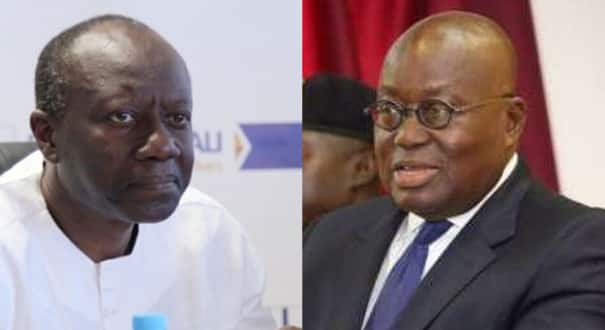Ghana is facing an economic relapse, a development which is threatening the long-term sustainability of the economy. A few years ago, Ghana’s economy was touted as one of the fastest growing in Africa, but now the once buoyant economy is in fiscal distress to the point of returning to the IMF. This current government led Ghana to exit a previous programme signed by the past government, and what a painful return to the take the same prescription.
The beleaguered Finance Minister, Mr. Ken Ofori-Atta, confirmed the fiscal distress confronting Ghana in the 2023 Budget Statement presented to Parliament two weeks ago. “We empathise with all Ghanaians for the undue pressures the economic challenges have placed on their livelihoods. We are confident that together, and with God on our side, we will turn things around,” Mr. Ofori-Atta told Parliament. Undoubtedly, Ghana’s current fiscal distress comes against the backdrop of unfavourable global and domestic trends.
Public debt developments
It was always expected that the total gross public debt would increase because of negative local and global trends. The 2023 Budget Statement states that as of September 2022, public debt stood at GH¢467,371.31million (US$48,871.34million), representing approximately 75.9 percent of GDP. The domestic debt component is GH¢195,657.60million, which is 31.79 percent of GDP while external debt is GH¢271,713.71million, representing 44.15 percent of GDP. The increase in the domestic debt is largely attributed to the rising interest costs.
The external debt as a percentage of the total debt stock currently stands at 58.1 percent as at end September 2022. The sharp growth in the external debt stock is largely driven by the depreciation of the local currency. The depreciation of the Ghana cedi added GH¢93,855.15million to the external debt stock. Overall, debt accumulation increased from 20.7 percent in 2021 to 32.7 percent as at end September 2022, reflecting the impact of the depreciation of the Ghana cedi on the external debt side. This paints a gloomy picture of our future prospects.
Expenditure performance
As if that was not enough, total expenditure for the period amounted to GH¢109,421million (18.5 percent of GDP), above the target of GH¢103,992million (17.6 percent of GDP) by 5.2 percent. Compensation of Employees amounted to GH¢27,146million (4.6 percent of GDP), 2.9 percent below the budgetary provision of GH¢27,947million (4.7 percent of GDP). The Wage bill constituted 91.3 percent of the total Compensation and amounted to GH¢24,734million.
Also, interest Payments for the period amounted to GH¢32,101 million (5.4 percent of GDP), against the target of GH¢30,890 million (5.2 percent of GDP). This reflects the higher cost of borrowing and the adverse impact of the currency depreciation on external interest, according to the Budget Statement. Over the period domestic interest payments constituted 78 percent of total interest payments for the period. The fiscal deficit for the period was financed mainly from domestic sources amounting to GH¢37,491 million (6.3% of GDP), accounting for 85.2 percent of the total financing. Foreign financing for the period amounted to GH¢6,531 million (1.1% of GDP) and accounted for the remaining 14.8 percent of the financing.
Consequently, the fiscal deficit target was revised to 6.6 percent of GDP down from the 7.4 percent set in the 2022 Budget. The government had to embark discretionary expenditure cuts, adjustment in interest payments, and adjustments in the allocation for compensation of employees to incorporate a 15 percent Cost of Living Allowance (COLA), adjustment in exchange rate on account of higher depreciation, and adjustment to the Benchmark Crude oil price.
Revenue shortfall
Against this backdrop, it is unfortunate that over the last three years Government recorded negative primary balance. This negative trend was a departure from the previous three years when positive primary balance was realized. This shortfall over the years resulted to an overall budget deficit of GH¢41,699 million (7.0% of GDP), against a deficit target of GH¢36,684 million (6.2% of GDP). The corresponding primary balance for the period was a deficit of GH¢9,597 million (1.6% of GDP), against a deficit target of GH¢5,794 million (1.0% of GDP).
According to the Budget Statement total revenue and grants amounted to GH¢65,399million (11.0 percent of GDP), compared with a target of GH¢67,307 (11.4 percent of GDP) and the GH¢49,108 million (10.7 percent of GDP) recorded in 2021. The shortfall in revenue stemmed from the less robust performance recorded in all the revenue handles for the period, says Mr. Ofori-Atta. Similarly domestic revenue for the period amounted to GH¢64,601million (10.9 percent of GDP), falling below GH¢66,503 million target (11.2 percent of GDP) by 2.9 percent.
Inflation and wage battles
Mr. Ofori-Atta indicated that due to the fragility of global environment Ghana’s economic recovery remains uncertain. In sub-Saharan Africa, growth is expected to slow down to 3.6 percent in 2022 and 3.7 percent in 2023, from 4.7 percent in 2021. This downward trend is basically due to low investment and a worsening trade balance in Africa, which has also impacted Ghana’s economy. As of 23rd November, 2022, the Ghana cedi depreciated cumulatively by 54.2 percent against the US dollar. Similarly, the Ghana cedi depreciated cumulatively by a 48.5 percent against the British pound.
These ultimately affected the increases in fuel prices and the resultant increases in prices of several goods and services. Currently inflation is 40.4 percent, according to the finance minister. But realistically inflation could be higher than reported, given the reality on the local market.
Mr. Ofori-Atta confirmed that high inflation rates continue to destroy the already meagre wages of the average Ghanaian. With workers coming under pressure due to high inflation, it is likely the Government will face intense, if destructive labour agitations. These labour agitations could undermine any attempt for the economy to cover from the current fiscal distress. Already organised labour and the Government have been unable to reach an agreement on the minimum wage for 2023. While government is offering 15 percent, organized labour is demanding an unreasonable 65 percent. If Government were to accede the labour demands, the economy will never recover.
No doubt, at the heart of Ghana’s current fiscal distress is the Government’s inability to generate substantial revenue to meet public expenditure. It is on record that public sector wages and payment on interests on local and foreign loans constitute the two biggest public expenditure year-on-year. In 2020 Government used GH¢33billion on wages and salaries, and this figure has been on the rise due to the recent public sector salary increases and the Cost-of-Living Adjustment (COLA). It is projected that Government will use GH¢37billion on interest rates, half of which is on domestic debts.
For the economy to come out of the woods, Government has no option than to aggressively increase revenue mobilisation. Henceforth individuals, small businesses, large businesses must be roped into the tax net. Painfully, there are several foreign companies operating in Ghana, which are not paying any taxes, despite drawing on the infrastructure of Ghana. The recent clampdown on foreign quarry companies for tax evasion is just a tip of the iceberg. This tax evasion is often facilitated by Ghanaians for their personal benefit to the detriment of our economy. While government plans to reduce public expenditure, this intervention alone will not reverse the fiscal distress. It will take an increase in local production, a reduction in unnecessary imports and innovative revenue mobilisation to resuscitate the economy.
Apart from negative revenue primary balance high imports has become a threat to our economic sustainability. An estimated US$400m (GH¢4.80billion) is used every month to import crude oil alone. Furthermore, the uncontrolled imports like rice, tin tomato, frozen chicken, toothpick and others is causing an unbridled demand for the dollar. This naturally undermines and weakens the value of the cedi. According to Mr. Ofori-Atta the high demand for dollars contributed to the depreciation of the cedi, which has lost about 53.8 percent of its value in 2022, perhaps, the worse in recent memory.
WASSCE results
Many people are going through pain listening to critics allude to unsubstantiated facts that the government is insensitive to the plight of Ghanaians. This is largely due to the government’s failure to strategically communicate key social and economic investments it is making despite the fiscal distress. Due to the current economic turbulence many people, especially parents and caregivers have suddenly forgotten the critical intervention the Free SHS policy has made in the lives of their children. Given the current fiscal distress, how many parents would have been able to take their children to secondary school, but for Free SHS? It is even sad that some Free SHS beneficiaries took to social media to insult the President for providing them with free secondary education, and hope for a better future. What a country to serve?
The current WASSCE results which have been described as the best in the last 20 years have been overshadowed by the economic turbulence, thanks to opposition propaganda, that is reinforced by some media. It baffles me why the opposition will have such dominance in communication and propaganda over the ruling party. It is wrong for the government to continue to depend on public goodwill for the success of its policies. In the second term of any government public goodwill wanes and or disappears as Ghanaians are always seeking to change a government, good or bad. In this light I think the Ministry of Finance and by extension the government failed to properly communicate the bond purchase and related issues to appropriate stakeholders. I stand to be corrected, but I think in this case too, the government depended on public goodwill, rather strategic of stakeholder communication. Government is simply failing to set the agenda for national discourse. I have heard several public comments that President Akufo Addo has become less caring because he succeeded in breaking the jinx that he could never become President of Ghana. His comments at Kwabre Constituency largely fed into this public perception. I hope this is not true and sincerely pray that he and his government will become proactive in policy implementation and strategic or stakeholder communication.
The question is, can Government overturn the current economic difficulties? For the economy to rebound organized labour must reconsider their demands for huge wages increases. The demand for 65 percent salary increases in 2023 is unrealistic and impracticable and should not be countenanced. Given the current economic meltdown sanity must prevail in the negotiations for wage increases. All Ghanaians must be prepared to subdue their personal interest for the national interest. It will take a higher level of patriotism for Ghana to transition from the current downward trend to accelerated development. We are in the boat together, and we float or sink together.










